|
1. Nets Barely Notice Surge in GDP as They Focus on Dow Plunge
The ABC, CBS and NBC evening newscasts on Friday all devoted full stories to the fall in the stock market, touted as "the worst two-day point drop for the Dow in five years," but barely had time for a sentence about the 3.4 percent second quarter jump in the GDP, the biggest in over a year. In fact, neither ABC nor NBC cited the specific 3.4 percent rise in the Gross Domestic Product, the measure which the AP on Friday described as the "best barometer of the country's economic fitness." ABC was the most negative. "Stock slide," anchor Charles Gibson teased, "Wall Street finishes the worst week of the year down nearly 600 points." Gibson soon highlighted that news, as he only alluded to the good GDP number, when he reported "the worst week for the Dow in five years. Even positive news on economic growth wasn't enough to keep investors from selling." Reporter Betsy Stark agreed as she too only made a passing reference to the GDP: "In fact, buried inside that positive report on Gross Domestic Product today was more evidence of what economists now describe as an outright recession in the housing sector." ABC didn't even put the GDP number on screen as Stark devoted her entire story to the impact of the declining housing market before concluding that "it increases the odds of a downturn in the overall economy..."
2. Broder Baffled Bush 'Against Providing Health Insurance for Kids'
Washington Post reporter and columnist David Broder, known as the "dean" of the Washington press corps, perfectly encapsulated, on Friday's Washington Week on PBS, the media establishment's more government spending is the answer to everything attitude when he acted bewildered as to how anyone could oppose a massive expansion of a federal health insurance program. When host Gwen Ifill raised how "Congress would like to double the number of children covered" by the State Children's Health Insurance Program (SCHIP), Broder marveled at how "the President has threatened the veto, and everybody I've talked to in the administration this past week says take that threat seriously." Broder equated federal spending with resolving a problem as he wondered: "I mean, who can be against providing health insurance for kids?" Talking over him, Ifill, a veteran of the New York Times and NBC News, echoed, "yeah." Neither Ifill nor Broder noted the amount of the proposed additional spending Bush would veto: $50 billion.
AUDIO&VIDEO

3. Olbermann Cracks: With Cheney Out,'Bush Will Get to Be President'
Keith Olbermann opened Friday night's Countdown show on MSNBC by cracking about how, with Vice President Dick Cheney scheduled for a surgical procedure Saturday to replace a battery, "for a few hours, at least, George W. Bush will actually get to be President."
4. ABC Uses Murder of Cop as Hook to Push for More Gun Control
On Friday's World News, ABC anchor Charles Gibson incorrectly implied that a murder suspect in New York City had purchased his weapon from a gun store in Virginia, ignoring the fact that the original owner, now deceased, had purchased the gun legally from the shop in 1999, and that police have not yet discovered how the suspect obtained the gun. Instead, Gibson contended that this case shows that criminals often go to shops for their weapons as he set up the piece: "Well, the recent shooting death of a New York City police officer is shedding some light on how criminals get their guns. Too often, they simply go to a store. And they know which stores to go to. According to the Bureau of Alcohol, Tobacco and Firearms, one percent of this nation's gun stores sell the guns that account for nearly 60 percent of the guns traced to crimes." During the shooting, another police officer was wounded by a second suspect using a gun purchased in Tennessee, but the ABC story, filed by correspondent David Wright, focused only on the gun involved in the fatal shooting of Officer Russel Timoshenko, and on the gun shop, R&B Guns, of Hampton, Virginia, that originally sold the weapon in 1999.
5. Rue Edwards Poverty Tour Shows 'Nation's Inability to Be Moved'
Newsweek's Jonathan Darman lamented in the July 30 issue that the John Edwards poverty tour/publicity tour didn't passionately grip America, that it did not immediately become a mythic event, like filthy-rich Bobby Kennedy's poverty tour in 1968. In a dramatic flourish, the young Harvard-educated reporter blamed this tragedy on a not-very-compassionate America: "There is something tragic about Edwards's failure to break through. Today, 37 million Americans live below the poverty line, 12 million more than at the time of Kennedy's death. And yet Edwards's call of conscience has not resonated. By all rights, Edwards, the son of a millworker, should have an easier time talking about poverty than did Kennedy, the son of a millionaire. His difficulty speaks to the candidate's inability to connect. It also speaks to the nation's inability to be moved."
 Nets Barely Notice Surge in GDP as They Nets Barely Notice Surge in GDP as They
Focus on Dow Plunge
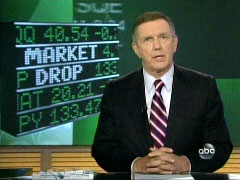 The ABC, CBS and NBC evening newscasts on Friday all devoted full stories to the fall in the stock market, touted as "the worst two-day point drop for the Dow in five years," but barely had time for a sentence about the 3.4 percent second quarter jump in the GDP, the biggest in over a year. In fact, neither ABC nor NBC cited the specific 3.4 percent rise in the Gross Domestic Product, the measure which the AP on Friday described as the "best barometer of the country's economic fitness." Not one of the three evening newscasts mentioned how the Dow is still well above the 13,000 level it broke through in April and none noted fresh good news on inflation.
The ABC, CBS and NBC evening newscasts on Friday all devoted full stories to the fall in the stock market, touted as "the worst two-day point drop for the Dow in five years," but barely had time for a sentence about the 3.4 percent second quarter jump in the GDP, the biggest in over a year. In fact, neither ABC nor NBC cited the specific 3.4 percent rise in the Gross Domestic Product, the measure which the AP on Friday described as the "best barometer of the country's economic fitness." Not one of the three evening newscasts mentioned how the Dow is still well above the 13,000 level it broke through in April and none noted fresh good news on inflation.
ABC was the most negative. "Stock slide," World News anchor Charles Gibson teased, "Wall Street finishes the worst week of the year down nearly 600 points." Gibson soon highlighted that news, as he only alluded to the good GDP number, when he reported "the worst week for the Dow in five years. Even positive news on economic growth wasn't enough to keep investors from selling. Among other things, they had to contend with a battered housing market." Reporter Betsy Stark agreed as she too only made a passing reference to the GDP: "It sure is, Charlie. In fact, buried inside that positive report on Gross Domestic Product today was more evidence of what economists now describe as an outright recession in the housing sector." ABC didn't even put the GDP number on screen as Stark devoted her entire story to the impact of the declining housing market before concluding that "it increases the odds of a downturn in the overall economy since housing now accounts for roughly one in ten American jobs."
Over on the CBS Evening News, anchor Katie Couric suggested "Wall Street investors may be seeing stars after the beating they took this week. The Dow had another big loss today, more than 200 points. For the week, the Dow gave up nearly 600 points -- or about four and a quarter percent -- its worst week in five years." Actually, percentage-wise, it's really the biggest drop in the Dow in four years. Reporter Kelly Wallace, formerly of CNN, began with a sentence about the GDP: "Better-than-expected economic growth for the second quarter touted by President Bush and still stocks tumbled." But unlike ABC and NBC, CBS at least put the "3.4%" on screen. As opposed ABC's dour spin, Wallace featured brokers and investors who expect the stock market to recover over the long term. Wallace pointed out that "from 1985 to 2006, the Dow grew an average of 8.6 percent per year. If you invested $1,000 back then, you'd have over $15,000 today."
NBC Nightly News anchor Brian Williams highlighted "the worst two-day point drop for the Dow in five years" before turning to CNBC's Erin Burnett for an explanation. After listing three reasons for the downturn, Burnett delivered one non-specific sentence about the GDP: "There is good news out there and today we found out the U.S. economy is growing a lot more quickly than people expected."
[This item was posted Friday night on the MRC's blog, NewsBusters.org: newsbusters.org ]
A Friday AP dispatch by Tim Paradis differentiated between the point and percentage reductions: "The Dow fell 208.10, or 1.54 percent, to 13,265.47, with nearly 140 points of that loss coming in the final half-hour of trading. For the week, the index fell more than 585 points, or 4.23 percent. The week's point decline was the worst in five years, while the percentage decline was the largest since late March 2003." See: news.yahoo.com
Another AP story on Friday, by Jeannine Aversa, led: "The economy popped out of its rut this spring and grew at the strongest pace in more than a year, giving President Bush something to crow about.
"The best barometer of the country's economic fitness -- gross domestic product -- increased at a 3.4 percent annual rate in the second quarter, the Commerce Department reported Friday...."
Aversa pointed out another upbeat development skipped by the networks: "An inflation gauge closely watched by the Federal Reserve showed "core" prices -- excluding food and energy -- rose at a rate of just 1.4 percent in the second quarter. That was down sharply from a 2.4 percent pace in the first quarter and was the smallest increase in four years."
Given how the media choose to highlight bad news on the economy over good news, another fact relayed by Aversa is hardly a shock: "Bush has been trying to counter weak public-approval ratings for his handling of the economy. Only 37 percent approve of his performance, close to a record low, according to a recent AP-Ipsos poll."
For Aversa's story: news.yahoo.com
The MRC's Brad Wilmouth corrected the closed-captioning against the video for the July 27 ABC and CBS evening newscast stories, I handled NBC:
# ABC's World News:
CHARLES GIBSON: Well, it's been a rough week on Wall Street. The Dow closed down 208 points today. For the week, it dropped 586. That's the worst week for the Dow in five years. Even positive news on economic growth wasn't enough to keep investors from selling. Among other things, they had to contend with a battered housing market. And ABC's Betsy Stark is here. And, Betsy, the housing slump seems to be taking its toll.
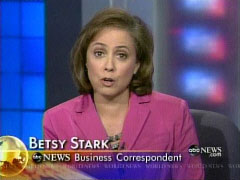 BETSY STARK: It sure is, Charlie. In fact, buried inside that positive report on Gross Domestic Product today was more evidence of what economists now describe as an outright recession in the housing sector. Just a couple of years ago, housing was a major engine of growth for the U.S. economy. Now, it's a major drag. Americans spent their dollars very cautiously last quarter, spooked by the slump in the housing market. BETSY STARK: It sure is, Charlie. In fact, buried inside that positive report on Gross Domestic Product today was more evidence of what economists now describe as an outright recession in the housing sector. Just a couple of years ago, housing was a major engine of growth for the U.S. economy. Now, it's a major drag. Americans spent their dollars very cautiously last quarter, spooked by the slump in the housing market.
IVY ZELMAN, Housing analyst: When the housing market hits the skids, everybody's feeling pretty concerned and house broke. And they stop spending or they slow down spending.
STARK: You don't need to tell Marsha Elliot the spigot's been turned off.
MARSHA ELLIOTT, Terrestris Development: The slowdown has been dramatic nationwide, as well as here in the Midwest. And we're all feeling it.
STARK: Last year, at this time, this Chicago homebuilder had around 35 homes under construction. This year? Only eight.
ELLIOTT: When I'm not building, that means the excavator is not working. The surveyor is not working. The engineer is not working. And that's at the very beginning.
STARK: Businesses that depend on homebuilding, from kitchen and bath retailers to furniture and carpet makers, are also getting squeezed. The International Council of Shopping Centers says the worst retail sales in four years can be summed up in one word: housing.
ZELMAN: Anything that touches housing to Wal-Mart sales are being negatively impacted. And I think that it's spread. The ripple effect is huge.
STARK: At Marvin Windows, one of the largest makers of windows and doors in the country, orders are certainly down.
DAN MARVIN, Marvin Windows: The concerns right now is how long the slump in the market is going to last.
STARK: Housing-related job cuts have tripled this year to more than 37,000, led by layoffs in construction and mortgage lending. And the consensus is the fallout is going to get worse before it gets better.
THOMAS LAWLER, Housing economist: It will probably take another year and a half or two years to work its way through.
STARK: That would mean no turnaround in the housing market until close to the end of the decade. And if that's right, it increases the odds of a downturn in the overall economy since housing now accounts for roughly one in ten American jobs, about 15 million American jobs.
# CBS Evening News:
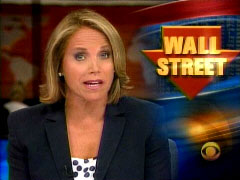 KATIE COURIC: Meanwhile, Wall Street investors may be seeing stars after the beating they took this week. The Dow had another big loss today, more than 200 points. For the week, the Dow gave up nearly 600 points -- or about four and a quarter percent -- its worst week in five years. Here's Kelly Wallace.
KATIE COURIC: Meanwhile, Wall Street investors may be seeing stars after the beating they took this week. The Dow had another big loss today, more than 200 points. For the week, the Dow gave up nearly 600 points -- or about four and a quarter percent -- its worst week in five years. Here's Kelly Wallace.
KELLY WALLACE: After a week of being pounded by bad news, the market couldn't even accept good news. Better-than-expected economic growth for the second quarter touted by President Bush-
GEORGE W. BUSH: It's an economy that is large and flexible and resilient.
WALLACE: -and still, stocks tumbled. Despite the Wall Street roller coaster, investors like Mary Ellen Scott are not concerned.
MARY ELLEN SCOTT, Investor: Well, I've been in it long enough to see it go up and go down and come back, so that's what I'm thinking it's going to do.
WALLACE: History is on her side. From 1985 to 2006, the Dow grew an average of 8.6 percent per year. If you invested $1,000 back then, you'd have over $15,000 today. Are the phones ringing off the hook?
ALYCE ZOLLMAN, Charles Schwab: Surprisingly, no.
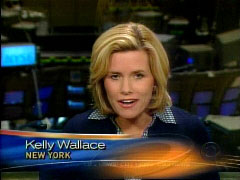 WALLACE: Alyce Zollman, a Charles Schwab financial consultant, says she tells her clients to think long-term, and not to panic by short-term swings like we saw this week. WALLACE: Alyce Zollman, a Charles Schwab financial consultant, says she tells her clients to think long-term, and not to panic by short-term swings like we saw this week.
ZOLLMAN: But ultimately, I think the most important point is to understand that investing is a lot like the weather. We can't predict the weather. We can't control the weather. The only thing that we can do is prepare for it. And investing's really no different.
WALLACE: After a turbulent week, the market can now catch its breath for a few days. The next big economic report, which could determine whether Wall Street continues its wild ride, is the unemployment rate, and, Katie, that comes out next Friday.
# NBC Nightly News:
BRIAN WILLIAMS: Now we move to Wall Street and a dramatic end to a brutal week for the markets: The worst two-day point drop for the Dow in five years. The sellers came out in force. The last half hour of trading today the Dow finished down another 208 points. You combine that with yesterday's 300-plus point drop, that put the loss over 500. We're joined tonight from CNBC by Erin Burnett.
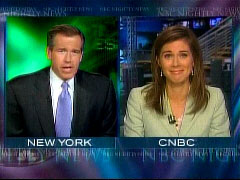 Erin, a lot of dire predictions today, downward spirals, corrections, bad hedge funds out there. What's doing this? Erin, a lot of dire predictions today, downward spirals, corrections, bad hedge funds out there. What's doing this?
ERIN BURNETT: Yes, I mean, it has been an amazing week, Brian. You said it, the worst we have seen in five years for the broader markets here in the U.S. and you say, why so much pain so suddenly? Alright, Brian, I broke it down. Three reasons: One, home prices, they are falling more than expected, and two, easy credit. It's simply gone. Loans are harder to come by for everyone. Third, energy prices. You talk a lot about those there, they are up and tonight oil prices closed a penny shy of a record. It is a perfect storm for stocks. But Brian, the truth is it's never quite that simple. There is good news out there and today we found out the U.S. economy is growing a lot more quickly than people expected, despite all of those head winds. I spent all day talking to money managers, the vast majority still firmly believe while the market will be very volatile in the short-term, we could have many more days like this though, they do believe we could end the year higher. So, we'll be talking a lot more about this story.
WILLIAMS: Everybody gets to take a breath over the weekend. We'll check back in on this on Monday as you will. Erin, thanks a lot for that.
  Broder Baffled Bush 'Against Providing Broder Baffled Bush 'Against Providing
Health Insurance for Kids'
|
Washington Post reporter and columnist David Broder, known as the "dean" of the Washington press corps, perfectly encapsulated, on Friday's Washington Week on PBS, the media establishment's more government spending is the answer to everything attitude when he acted bewildered as to how anyone could oppose a massive expansion of a federal health insurance program. When host Gwen Ifill raised how "Congress would like to double the |

 | |
 | |

More See & Hear the
Bias |
| number of children covered" by the State Children's Health
Insurance Program (SCHIP), Broder marveled at how "the President has threatened the veto, and everybody I've talked to in the administration this past week says take that threat seriously." Broder equated federal spending with resolving a problem as he wondered: "I mean, who can be against providing health insurance for kids?" Talking over him, Ifill, a veteran of the New York Times and NBC News, echoed, "yeah." Neither Ifill nor Broder noted the amount of the proposed additional spending Bush would veto: $50 billion. |
Reuters story on the proposal of the House Democrats: www.washingtonpost.com
Broder did at least go on to explain how Bush "wants a much bigger change, a change that would involve rewriting the way in which we provide for deductions for health insurance, that would enable people to buy individual health insurance policies themselves. But he is opposed to anything that says federal government is going to underwrite more health insurance for more people. That, to him, is creeping socialism." Maybe because it is.
[This item was posted Sunday night on the MRC's blog, NewsBusters.org: newsbusters.org ]
The exchange on the July 27 Washington Week, provided by the MRC's Brad Wilmouth who corrected the closed-captioning against the video:
GWEN IFILL: Well, every other dispute we've talked about tonight is basically rooted in partisanship. But another looming clash has Republicans and Democrats on one side and the White House on the other. The disagreement is over the federally funded state children's health insurance program. Congress would like to double the number of children covered. The administration says that would simply cost too much. So is this all going to come to a head in a presidential veto, David?
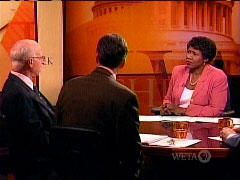 DAVID BRODER: Well, the President has threatened the veto, and everybody I've talked to in the administration this past week says take that threat seriously. He's on possibly the worst possible domestic issue to which to threaten the veto. I mean, who can be against providing health insurance- DAVID BRODER: Well, the President has threatened the veto, and everybody I've talked to in the administration this past week says take that threat seriously. He's on possibly the worst possible domestic issue to which to threaten the veto. I mean, who can be against providing health insurance-
IFILL: Yeah.
BRODER: -for kids?
IFILL: So what's the reason?
BRODER: But he has drawn the line. Why has he drawn the line? Because in the seventh year of his presidency, he decided that he has his own way of reforming health care, and he is very frustrated that the Congress won't pay attention to the proposal that he has put. He wants a much bigger change, a change that would involve rewriting the way in which we provide for deductions for health insurance, that would enable people to buy individual health insurance policies themselves. But he is opposed to anything that says federal government is going to underwrite more health insurance for more people. That, to him, is creeping socialism.
PETE WILLIAMS: Is it the coverage for children or is it their concern that it also covers parents and it's beginning to spread it around more than just children?
BRODER: Well, the program is primarily for children. But because states have been encouraged by the administration for the last six years to use this money in creative ways, the states, many of them, have said we'll not only take care of the kids, but if their parents aren't insured, we will extend the insurance to the uninsured parents. The idea being the more people you can provide coverage for, the better. The President now says we want to draw the line, it should be only for children and only for the poorest children.
  Olbermann Cracks: With Cheney Out,'Bush Olbermann Cracks: With Cheney Out,'Bush
Will Get to Be President'
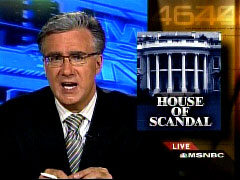 Keith Olbermann opened Friday night's Countdown show on MSNBC by cracking about how, with Vice President Dick Cheney scheduled for a surgical procedure Saturday to replace a battery, "for a few hours, at least, George W. Bush will actually get to be President."
Keith Olbermann opened Friday night's Countdown show on MSNBC by cracking about how, with Vice President Dick Cheney scheduled for a surgical procedure Saturday to replace a battery, "for a few hours, at least, George W. Bush will actually get to be President."
Olbermann asserted at the start of his July 27 show: "Tomorrow morning Vice President Cheney will undergo surgery to have the battery replaced on his heart defibrillator -- which means an exact reversal of last week's colonoscopy and invocation of the 25th amendment. For a few hours, at least, George W. Bush will actually get to be President. Our fifth story on the Countdown, let's hope he uses his alone-time wisely because today his administration was again reduced to try to reform clear reality into foggy myth with a dedication of language-parsing that makes Bill Clinton look like a chronic generalizer. Not that you would have known anything wrong from Mr. Bush's schedule today devoted to an economic speech and to handing out science medals....
[This item was posted late Friday night on the MRC's blog, NewsBusters.org: newsbusters.org ]
  ABC Uses Murder of Cop as Hook to Push ABC Uses Murder of Cop as Hook to Push
for More Gun Control
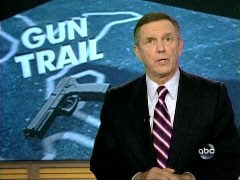 On Friday's World News, ABC anchor Charles Gibson incorrectly implied that a murder suspect in New York City had purchased his weapon from a gun store in Virginia, ignoring the fact that the original owner, now deceased, had purchased the gun legally from the shop in 1999, and that police have not yet discovered how the suspect obtained the gun. Instead, Gibson contended that this case shows that criminals often go to shops for their weapons as he set up the piece: "Well, the recent shooting death of a New York City police officer is shedding some light on how criminals get their guns. Too often, they simply go to a store. And they know which stores to go to. According to the Bureau of Alcohol, Tobacco and Firearms, one percent of this nation's gun stores sell the guns that account for nearly 60 percent of the guns traced to crimes."
On Friday's World News, ABC anchor Charles Gibson incorrectly implied that a murder suspect in New York City had purchased his weapon from a gun store in Virginia, ignoring the fact that the original owner, now deceased, had purchased the gun legally from the shop in 1999, and that police have not yet discovered how the suspect obtained the gun. Instead, Gibson contended that this case shows that criminals often go to shops for their weapons as he set up the piece: "Well, the recent shooting death of a New York City police officer is shedding some light on how criminals get their guns. Too often, they simply go to a store. And they know which stores to go to. According to the Bureau of Alcohol, Tobacco and Firearms, one percent of this nation's gun stores sell the guns that account for nearly 60 percent of the guns traced to crimes."
Friday's Washington Post reported the legal sale in 1999: www.washingtonpost.com
During the shooting, another police officer was wounded by a second suspect using a gun purchased in Tennessee, but the ABC story, filed by correspondent David Wright, focused only on the gun involved in the fatal shooting of Officer Russel Timoshenko, and on the gun shop, R&B Guns, of Hampton, Virginia, that originally sold the weapon in 1999. Wright cited a 2004 study by gun control advocacy group (ww.vahv.org ) Americans for Gun Safety Foundation (AGS), although without actually mentioning the group's name, which reported that of all gun stores in America, R&B Guns sold the fifth largest number of weapons that ended up being found by police in the hands of criminals. Wright then showed a clip of gun control advocate Jim Kessler, co-founder of the left-leaning Third Way and former member of AGS who was involved in the study. Kessler: "There's thousands of guns that this store sold that have been used in crimes. And now a cop has been killed."
According to the Daily Press (Newport News, Virginia), R&B Guns owner Richard Norad's legal trouble began when, "while checking the transaction forms for R&B in 1998, State Police found that the store's gun sale documents omitted a potential buyer's second identification," as the law requires two forms of ID for a purchase. After Norad was issued five warnings, he was charged with 10 such failures to provide a second ID that occurred between January 1998 and April 2000. Notably, the Daily Press also relayed that Norad "filed 2,300 transaction forms with the State Police in 1999," which would suggest that the total number of incomplete transaction forms may have been 10 out of as many as 5,000. No details were reported by the Daily Press on whether authorities interviewed the purchasers involved in the 10 incidents to see if they were legally entitled to their purchases or if any of these guns made their way to criminals.
Without providing details on Norad's violations, Wright concluded his report continuing to suggest that the gun shop owner had sold a gun to the killer directly: "Virginia authorities finally closed down R&B Guns several years ago. The store owner pled guilty to selling firearms without checking ID's and served a two-year probation. This week he told the New York Daily News it's very upsetting that one of the guns he sold was used to kill a cop."
Wright's take matched an equally distorted Friday New York Daily News article: www.nydailynews.com
[This item, by Brad Wilmouth, was posted Saturday on the MRC's blog, NewsBusters.org: newsbusters.org ]
Below is a complete transcript of David Wright's piece from the Friday, July 27 World News with Charles Gibson:
CHARLES GIBSON: Well, the recent shooting death of a New York City police officer is shedding some light on how criminals get their guns. Too often, they simply go to a store. And they know which stores to go to. According to the Bureau of Alcohol, Tobacco and Firearms, one percent of this nation's gun stores sell the guns that account for nearly 60 percent of the guns traced to crimes. Here's ABC's David Wright.
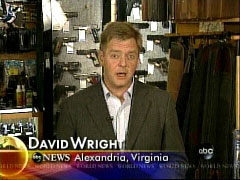 DAVID WRIGHT: When a New York City police officer is killed in the line of duty, the funeral is a city event, fraught with grief and anger. Officer Russel Timoshenko was gunned down July 9th. And authorities now know where the gun came from. They've traced it back to R&B Guns of Hampton, Virginia, a store with a terrible reputation. DAVID WRIGHT: When a New York City police officer is killed in the line of duty, the funeral is a city event, fraught with grief and anger. Officer Russel Timoshenko was gunned down July 9th. And authorities now know where the gun came from. They've traced it back to R&B Guns of Hampton, Virginia, a store with a terrible reputation.
JOHN FEINBLATT, Office of New York City Mayor: What we know is that R&B had 1,116 guns that were used in crimes over a five-year period.
WRIGHT: A 2004 study found that 120 gun stores accounted for at least 55,000 guns used in crimes. And on that list, the fifth-worst offender was R&B Guns.
JIM KESSLER, Third Way: There's thousands of guns that this store sold that have been used in crimes. And now a cop has been killed.
WRIGHT: Officer Timoshenko's death has lent new urgency to New York Mayor Michael Bloomberg's campaign to go after out-of-state gun dealers, suing 27 dealers around the country. Officials in New York say Virginia needs to do a better job of keeping guns out of the hands of criminals. But Virginians resent that. They say New Yorkers should mind their own business.
MICHAEL ZARLENGA, The Trophy Room: New York has its own problems, has its own troubles. They need to concentrate on what's being done in New York.
WRIGHT: Virginia authorities finally closed down R&B Guns several years ago. The store owner pled guilty to selling firearms without checking ID's and served a two-year probation. This week he told the New York Daily News it's very upsetting that one of the guns he sold was used to kill a cop. David Wright, ABC News, Alexandria, Virginia.
  Rue Edwards Poverty Tour Shows 'Nation's Rue Edwards Poverty Tour Shows 'Nation's
Inability to Be Moved'
Newsweek's Jonathan Darman lamented in the July 30 issue that the John Edwards poverty tour/publicity tour didn't passionately grip America, that it did not immediately become a mythic event, like filthy-rich Bobby Kennedy's poverty tour in 1968. In a dramatic flourish, the young Harvard-educated reporter blamed this tragedy on a not-very-compassionate America: "There is something tragic about Edwards's failure to break through. Today, 37 million Americans live below the poverty line, 12 million more than at the time of Kennedy's death. And yet Edwards's call of conscience has not resonated. By all rights, Edwards, the son of a millworker, should have an easier time talking about poverty than did Kennedy, the son of a millionaire. His difficulty speaks to the candidate's inability to connect. It also speaks to the nation's inability to be moved."
For Darman's piece in the July 30 Newsweek, "The Down and Out Tour: Edwards's poverty campaign echoes RFK's, but times have changed (and Edwards is no RFK)," go to: www.msnbc.msn.com
[This item is based on a Friday NewsBusters posting by Tim Graham: newsbusters.org ]
-- Brent Baker

Home | News Division
| Bozell Columns | CyberAlerts
Media Reality Check | Notable Quotables | Contact
the MRC | Subscribe
|























 The ABC, CBS and NBC evening newscasts on Friday all devoted full stories to the fall in the stock market, touted as "the worst two-day point drop for the Dow in five years," but barely had time for a sentence about the 3.4 percent second quarter jump in the GDP, the biggest in over a year. In fact, neither ABC nor NBC cited the specific 3.4 percent rise in the Gross Domestic Product, the measure which the AP on Friday described as the "best barometer of the country's economic fitness." Not one of the three evening newscasts mentioned how the Dow is still well above the 13,000 level it broke through in April and none noted fresh good news on inflation.
The ABC, CBS and NBC evening newscasts on Friday all devoted full stories to the fall in the stock market, touted as "the worst two-day point drop for the Dow in five years," but barely had time for a sentence about the 3.4 percent second quarter jump in the GDP, the biggest in over a year. In fact, neither ABC nor NBC cited the specific 3.4 percent rise in the Gross Domestic Product, the measure which the AP on Friday described as the "best barometer of the country's economic fitness." Not one of the three evening newscasts mentioned how the Dow is still well above the 13,000 level it broke through in April and none noted fresh good news on inflation.  BETSY STARK: It sure is, Charlie. In fact, buried inside that positive report on Gross Domestic Product today was more evidence of what economists now describe as an outright recession in the housing sector. Just a couple of years ago, housing was a major engine of growth for the U.S. economy. Now, it's a major drag. Americans spent their dollars very cautiously last quarter, spooked by the slump in the housing market.
BETSY STARK: It sure is, Charlie. In fact, buried inside that positive report on Gross Domestic Product today was more evidence of what economists now describe as an outright recession in the housing sector. Just a couple of years ago, housing was a major engine of growth for the U.S. economy. Now, it's a major drag. Americans spent their dollars very cautiously last quarter, spooked by the slump in the housing market.  KATIE COURIC: Meanwhile, Wall Street investors may be seeing stars after the beating they took this week. The Dow had another big loss today, more than 200 points. For the week, the Dow gave up nearly 600 points -- or about four and a quarter percent -- its worst week in five years. Here's Kelly Wallace.
KATIE COURIC: Meanwhile, Wall Street investors may be seeing stars after the beating they took this week. The Dow had another big loss today, more than 200 points. For the week, the Dow gave up nearly 600 points -- or about four and a quarter percent -- its worst week in five years. Here's Kelly Wallace.  WALLACE: Alyce Zollman, a Charles Schwab financial consultant, says she tells her clients to think long-term, and not to panic by short-term swings like we saw this week.
WALLACE: Alyce Zollman, a Charles Schwab financial consultant, says she tells her clients to think long-term, and not to panic by short-term swings like we saw this week.  Erin, a lot of dire predictions today, downward spirals, corrections, bad hedge funds out there. What's doing this?
Erin, a lot of dire predictions today, downward spirals, corrections, bad hedge funds out there. What's doing this? 




 DAVID BRODER: Well, the President has threatened the veto, and everybody I've talked to in the administration this past week says take that threat seriously. He's on possibly the worst possible domestic issue to which to threaten the veto. I mean, who can be against providing health insurance-
DAVID BRODER: Well, the President has threatened the veto, and everybody I've talked to in the administration this past week says take that threat seriously. He's on possibly the worst possible domestic issue to which to threaten the veto. I mean, who can be against providing health insurance- 
 Keith Olbermann opened Friday night's Countdown show on MSNBC by cracking about how, with Vice President Dick Cheney scheduled for a surgical procedure Saturday to replace a battery, "for a few hours, at least, George W. Bush will actually get to be President."
Keith Olbermann opened Friday night's Countdown show on MSNBC by cracking about how, with Vice President Dick Cheney scheduled for a surgical procedure Saturday to replace a battery, "for a few hours, at least, George W. Bush will actually get to be President." 
 On Friday's World News, ABC anchor Charles Gibson incorrectly implied that a murder suspect in New York City had purchased his weapon from a gun store in Virginia, ignoring the fact that the original owner, now deceased, had purchased the gun legally from the shop in 1999, and that police have not yet discovered how the suspect obtained the gun. Instead, Gibson contended that this case shows that criminals often go to shops for their weapons as he set up the piece: "Well, the recent shooting death of a New York City police officer is shedding some light on how criminals get their guns. Too often, they simply go to a store. And they know which stores to go to. According to the Bureau of Alcohol, Tobacco and Firearms, one percent of this nation's gun stores sell the guns that account for nearly 60 percent of the guns traced to crimes."
On Friday's World News, ABC anchor Charles Gibson incorrectly implied that a murder suspect in New York City had purchased his weapon from a gun store in Virginia, ignoring the fact that the original owner, now deceased, had purchased the gun legally from the shop in 1999, and that police have not yet discovered how the suspect obtained the gun. Instead, Gibson contended that this case shows that criminals often go to shops for their weapons as he set up the piece: "Well, the recent shooting death of a New York City police officer is shedding some light on how criminals get their guns. Too often, they simply go to a store. And they know which stores to go to. According to the Bureau of Alcohol, Tobacco and Firearms, one percent of this nation's gun stores sell the guns that account for nearly 60 percent of the guns traced to crimes."  DAVID WRIGHT: When a New York City police officer is killed in the line of duty, the funeral is a city event, fraught with grief and anger. Officer Russel Timoshenko was gunned down July 9th. And authorities now know where the gun came from. They've traced it back to R&B Guns of Hampton, Virginia, a store with a terrible reputation.
DAVID WRIGHT: When a New York City police officer is killed in the line of duty, the funeral is a city event, fraught with grief and anger. Officer Russel Timoshenko was gunned down July 9th. And authorities now know where the gun came from. They've traced it back to R&B Guns of Hampton, Virginia, a store with a terrible reputation. 